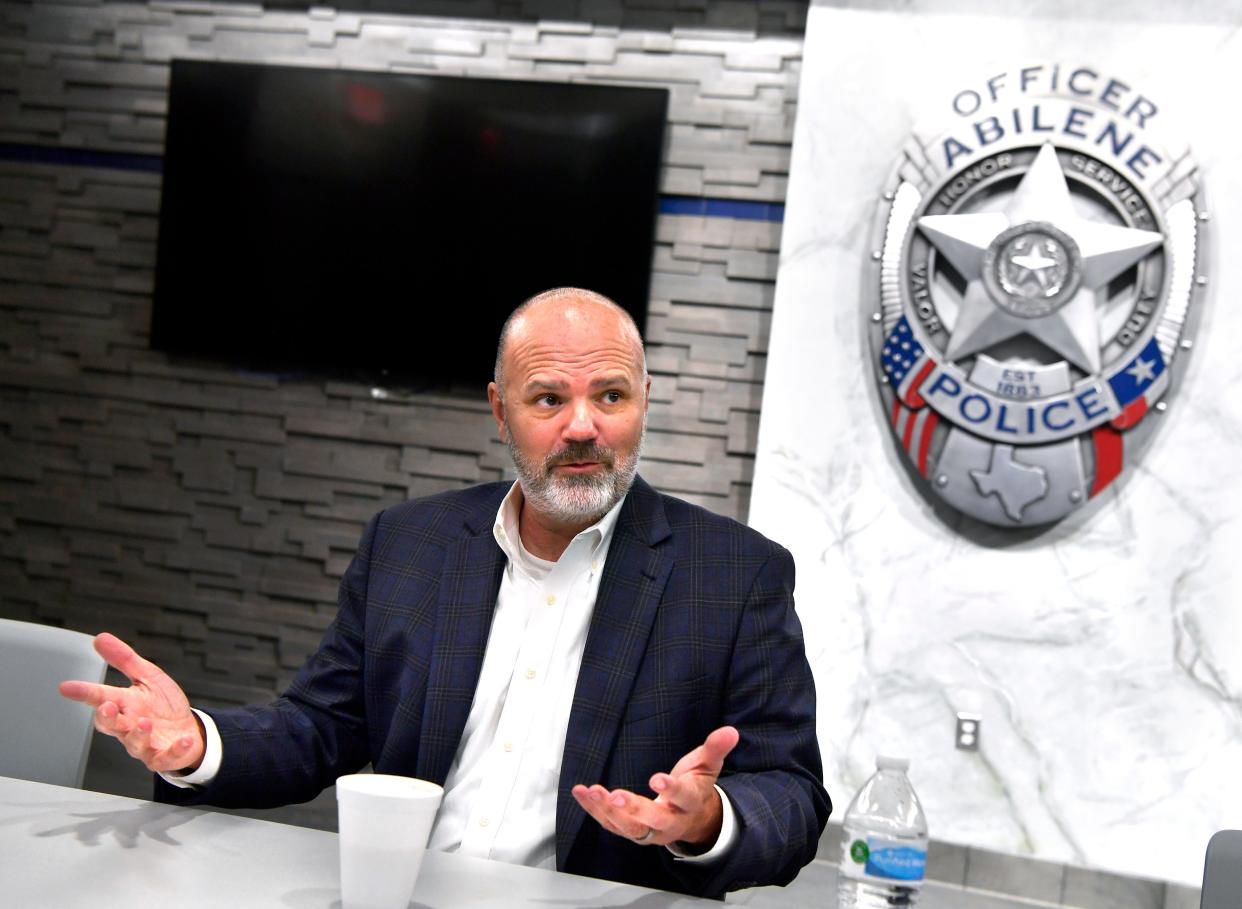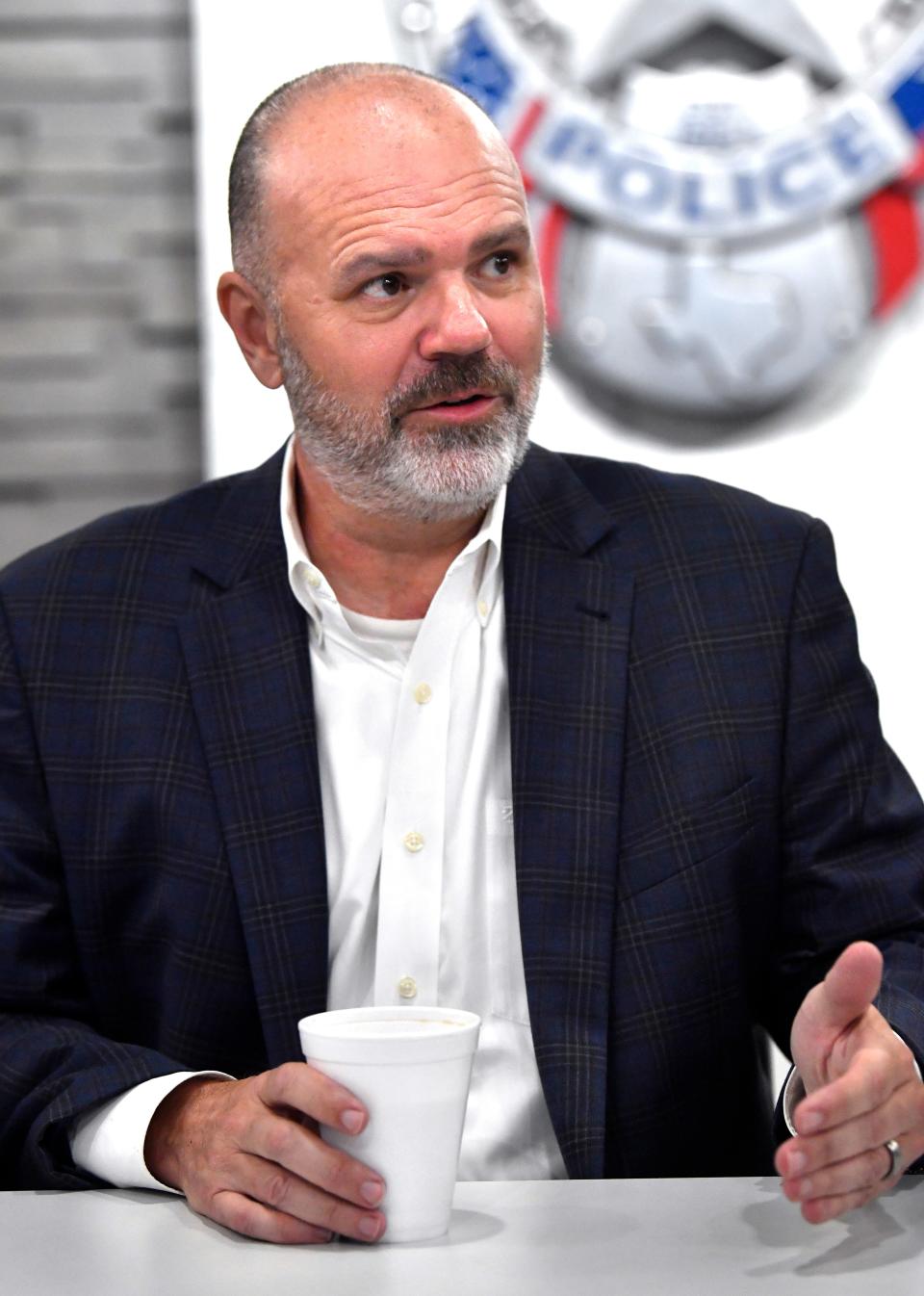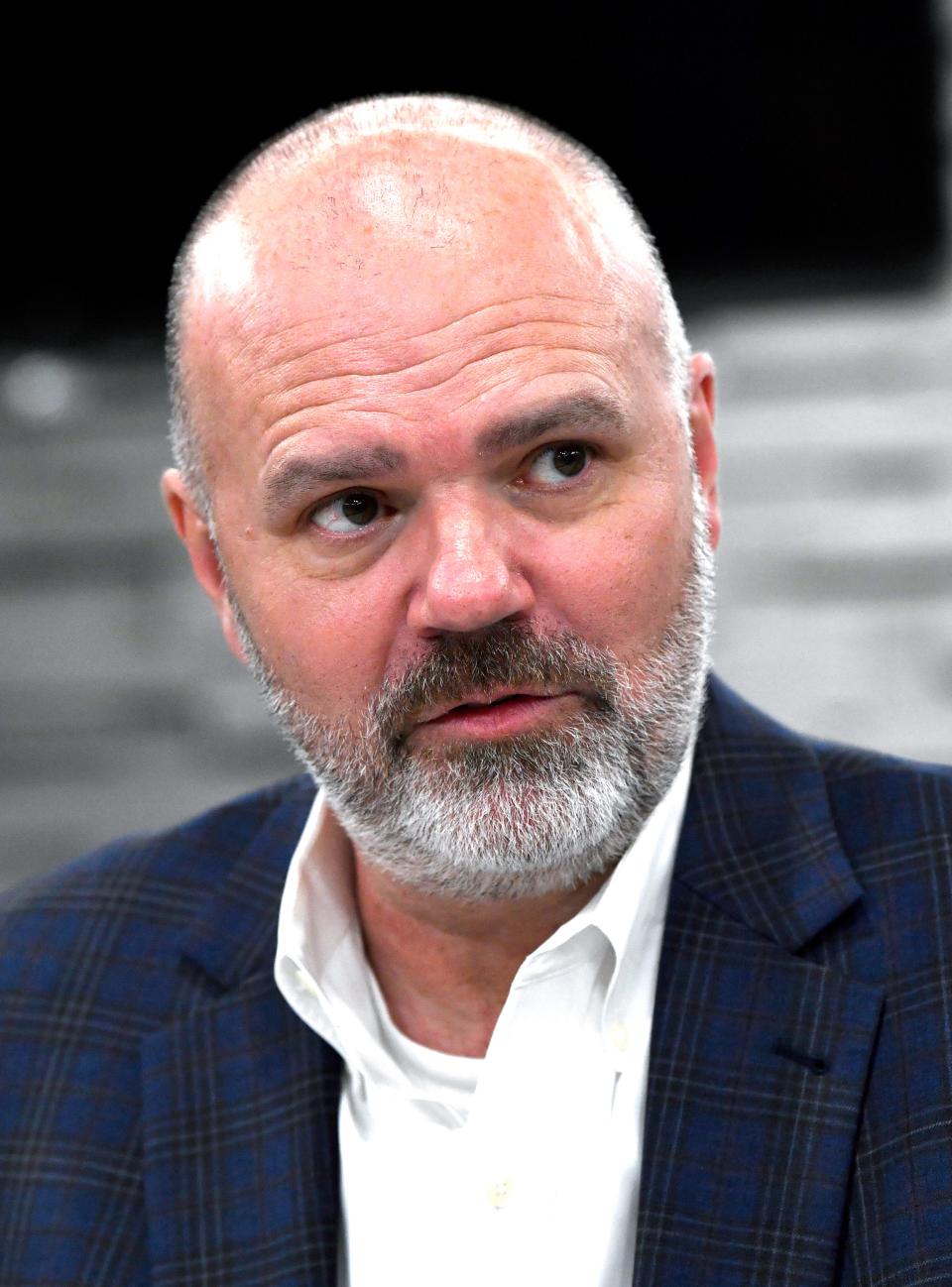Meet the new guy: APD's public safety director lays out plan for new chief

Troy Riggs has not joined the Abilene Police Department as a Texas sworn officer, to fix something that's broken or to be its next chief.
He's here, he said Friday, to guide the department toward the hiring of its next leader. His title is director of public safety, though he is overseeing only the city's police department. Doug Wrenn remains interim chief, overseeing day-to-day operation.
The department has been without a full-time chief since the departure of Marcus Dudley Jr. at the end of March. Dudley had been chief for 26 months, succeeding Stan Standridge in January 2021.
The search for a new chief likely will begin in six months, City Manager Robert Hanna said. How long that process will take from there is unknown, maybe another six months. Riggs could stay until the new chief begins work.
Though word is out that the job is open, applications currently are not being taken.
Several times, Riggs mentioned "letting the dust settle."
Asked to elaborate, he identified that as recent instability at the top. Standridge was chief from 2009 to November 2020. He left under duress regarding his relationship with a woman that he supervised. Dudley left before most expected he would. Thus, the department will have three leaders in just over a three-year span whne a new chief comes aboard.
Dudley was Abilene's 17th chief since 1888. The city first had a city marshal. The next marshal, John Clinton, became the first chief.
Riggs said there are worthy internal candidates but that a national search is only fair to the community. He is not leaning one way or the other, citing the hometown knowledge of an internal candidate as a plus, as would be the fresh ideas and perspective of an outside candidate.
He compared the situation to basketball - he is from Kentucky. A team can win with good offense or good defense. That's most often dictated by the talents of the players.
The next chief won't be given a blueprint to follow but a solid assessment of the department - what it does well, how it is challenged, he said.
"If I'm going there, I want to put my own work into it," said. "Just enough information to help them build that plan, knowing what the community thinks, and they'll bring their own thoughts and vision.
"And they should because they've been entrusted in this leadership."
Buying into the department
Riggs, who lives in Alice and is the former chief of police in Corpus Christi, arrived in Abilene only recently.
On Friday, Riggs met for an hour with local media representatives. He has spent considerable time with APD personnel already and now is meeting those in the community.
It was his birthday - he turned 57 - and he joked that he was headed to IHOP to take advantage of its senior discounts.
"Which is pretty exciting," he said.
Riggs appeared at ease.
"You'll find me very communicative," he said. That goes both for the public but especially inside APD headquarters.
"I need their buy-in," he said.
His wife of 32 years, Kara, soon will join him here. They do not intend to be outsiders but become involved in Abilene during this phase in their lives.
Riggs has hopped to it already, attending meetings and roll calls and getting a first-hand look at APD in action Wednesday, when two shootings on the west side of town, north and south, got full attention. He was struck, he said, by how professionally those were handled, but not at the expense of regular duties.
Riggs called APD a good department, similar to the one he served 15 years ago when he was in Louisville Kentucky.
"This is a great department," he said.
He hasn't been a listening post for griping.
"They are talking more about what they want in the future," he said. "That's a remarkably mature workforce."
At his first glance, the department may be lacking only in how it's set up for the future. APD is ready for today and tomorrow, he said, but what about years ahead? In October, APD's total of sworn officers will rise to 235, its highest level ever. It is a sizable organization, and there's a big difference between departments under 200 and those above that total.
Riggs envisions that total going to 300 and 350 in 5-10 years. Maybe 400 in the decades ahead.

"The challenges to getting there are immense." he said.
To get there, he said, starts now and with him laying out a plan.
"I expect him to provide a detailed analysis of the department with the benefit of an immersion leadership experience with the department," Hanna said.
"The incoming chief can use this as a helpful orientation tool. "
A bit about him
Riggs detailed his 30-year journey in law enforcement. He did not take a standard path.
He touted and promised transparency, and he proved it Friday, As a college student, he put in to become a police officer in the Jefferson County Police Department and failed. He finished at the University of Louisville, and re-examined the process, pushing himself to be better prepared.
He was chosen for a 16-member class, 15 of whom made it.
Riggs compared a good department there with the one he has found here.
"A very dedicated workforce, a very intelligent workforce, very good training center," he said.
Riggers got into administration faster than most, due in part to the effort by the judge executive (similar to a county judge in Texas) to merge city and county governments. He was asked to be part of the team to promote a referendum that, after two failed votes, was passed.
That experience showed him how the police department worked with other departments, which is essential, he said.
The new county executive chose Riggs to be his chief of staff, and Riggs learned under his mentorship for the next seven years.
He said the beginning was rocky, as the new organization began with two of everything. There was not even a common uniform as the two departments, as might be expected, were not so willing to give in too much.
Riggs worked through all this and got a reputation as someone who get a tough job done.
That led him to Corpus Christi in 2009 as chief. There, he needed to do some fixing. The Department of Justice was about to swoop in to investigate hiring practices. Riggs discovered the problem was in human resources - while hiring was diverse, the process worked against women. Ironically, HR was headed by a woman.
"At the end of the day, we were wrong as a city," he said.
The issue was addressed publicly with a promise to fix them, and changes started even before DOJ entered the picture a year or so later.
Riggs said the buck stopped with the new guy.
"When you take a chief's position, you own it all. Ten years ago, 15 years ago, you own it all," he said.
Riggs was sought by Indianapolis to be its public safety director. There, he was over police, fire, animal control and other services. He oversaw 3,300-3,400 employees.
His challenge was to trim the budget due to the recession while even enhancing services. He did that with efficiency measures, he said.
Riggs was asked by the mayor of Denver to take a public safety role there, then entered the corporate world - just as a pandemic struck.
He remains a consultant, not just for law enforcement but for churches, cities and corporations.
This resume of experience qualifies him to assess the Abilene Police Department.
He got a call from Hanna, who told him, 'We've got a great police department ... but we've had a little bit of dust. I need someone to come in and let the dust settle, and then we need to figure out where we're going in the future."
Riggs called Hanna both honest and forthright, unlike some city managers with whom he has worked.

"If you told me six months ago that I'd be doing this, I wouldn't think I would," he said.
He visited the department before taking this latest assignment.
"I'd like to help (Hannah) build a vision for the future and laying out some guidelines for the new chief," Riggs said. His job is define metrics for the hiring of the next chief.
He will listen to the community and just as importantly, to department personnel. That's why he started first with them.
Riggs said he is not tasked with building a plan for the future. That's the next chief's job. Until then, he said, APD will be capably led by Wrenn, he said. Riggs will step into a decision only if necessary. He didn't seem anticipate that Friday.
"The city manager made it clear. "I'm not asking you to fix anything. If you see anything wrong, we need to address it. But the police department isn't broken. What I need you to do is let the dust settle, take time to be an active listener, find out what the officers are saying and thinking, and craft a vision for that department.'"
Riggs makes his points
∎ The future
Sometimes, that task is forgotten in the day-to-day operation, he said.
"We do today and tomorrow very well," Riggs said, emphasizing that is the case for most departments across the country. What will the challenges to the community be in six months or two years?
∎ Data
"You will hear me talking a lot about data," he said.
Some statistics, he said, are close to worthless. For example, crime statistics. It's comparing apples to watermelons.
But accurate, detailed data is crucial to making the best decisions in operations, he said.
"Data will help you be efficient and it will help you be very effective," he said.
He's not going to gather that information; APD personnel to develop a data sets, using community input.
Riggs said police departments exist for three reasons:
Reduce crime
Reduce the fear of crime
Enhance public safety.
Data allows a department to be successful at all three.
But, Riggs quickly added, data must be balanced with the what officers patrolling the streets know.
∎ Transparency
Riggs promised transparency, something that he believes is important, and a philosophy he will instill in APD.
"We want to be transparent in all things," he said. "A promise that I will make to the community right now, the same promise I made to our officers. is that if we ever find ourselves doing something that we find out is wrong or we made a bad decision, I'll be honest and tell you that.
"The citizens should not be worried about a police department telling the truth. That certainly hasn't been the history here, but we don't want it to change in the future."
∎ Trust
An officer, he said, should leave a resident hopeful of a resolution. That a good outcome for, say, a theft is possible
That builds trust between the public and the police.
If that happens, residents are reassured when police say that a neighborhood or time of day is safe.
This article originally appeared on Abilene Reporter-News: Meet the new guy: APD public safety director lays out plan for new chief

